This is the first in a series of articles that specifically address trends in the supplement industry.
A trend may eventually produce awareness of a beneficial supplement, like with collagen and CBD but often the negatives far outweigh the benefits. Poor quality products flood the market. Claims are made not backed by science. People get ripped off.
Because of this, I believe we need a new rallying cry: Death to Trendy Supplements! More on that in the future.
Today’s trendy topic is charcoal toothpaste. Before we get into the analysis, can someone help me understand what it is about this that looks like something you can get behind?
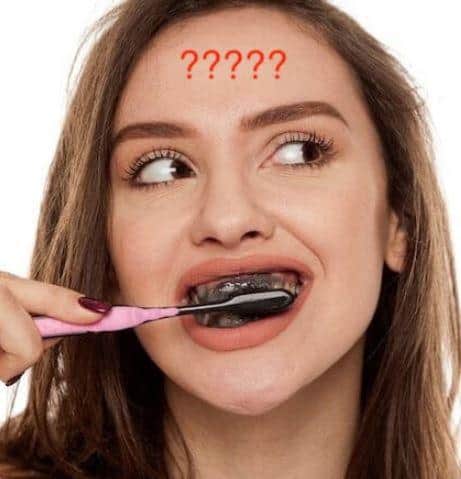
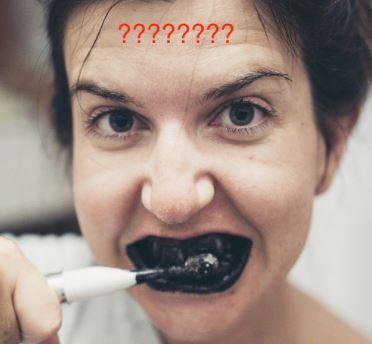
What about this one?
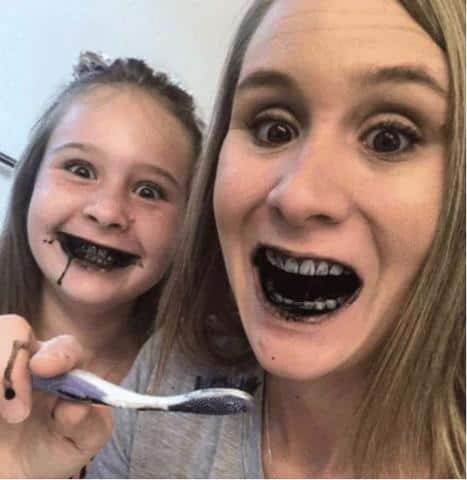
This isn’t a joke! Stop laughing!
These are the actual pictures used to PROMOTE this craziness….
If you search around online, you’ll see most commenters have both curiosity and excitement to make their mouth look like they ate a row of Oreos. Smashing a box of Oreos against your gums is a fine practice, but one that I only advise people do about 10 minutes before going to see your dentist to ensure you get your money’s worth. Listen to my podcast with the Holistic Dentist Claudia Patch to get her thoughts on that 🙂
What Exactly Is Charcoal Toothpaste?
Charcoal toothpaste is simply and literally a toothpaste that’s been formulated with activated charcoal as one of its ingredients.
Activated charcoal is exactly what you think it is – it’s charcoal. This isn’t the briquette used to smoke your meat of choice, but instead a form that’s been processed in a way to create a fine and very porous powder. This unique formulation allows the surface area to be MASSIVE, and the product is effective to absorb lots of compounds.
How much charcoal is found in these toothpastes? Great question. Most products don’t specify the amount or percentage of activated charcoal, so there’s a chance you’re getting a bait-and-switch or pixie dust amounts of charcoal.
If there were a concentration of charcoal that COULD have a benefit on your teeth, you wouldn’t know if the product in front of you meets that claim.
Often charcoal is listed in the “Inactive Ingredients” section of the Drug Facts panel, and in the case of the one included as well as many others, it’s listed low, meaning it’s one of the smallest ingredients by weight.

Activated charcoal IS a crucial compound in medicine. It’s used as a treatment for accidental (or intentional, I guess!) poisonings. If someone overdoses on an ORAL product, activated charcoal when administered in a timely manner will help absorb in the bad stuff.
It doesn’t work for everything, though, as some chemical compounds are not affected by or absorbable into activated charcoal.
Tablets and powder of activated charcoal are available over-the-counter for GI upset, usually bloating, gas, or diarrhea. In anecdotal and clinical evidence, it has been found to be ineffective. That doesn’t stop people from trying. I’d recommend a healthier gut program before anyone start eating charcoal tablets.
What does this have to do with your teeth? Activated charcoal DOES have benefits, and this is the justification marketers exploit while marketing a toothpaste. Let’s explore that…
The Charcoal Toothpaste Pitch
I don’t know the chicken v. egg relationship of a trend: Does a Kardashian post something for money and then everyone rushes to fill in the “science”, or vice-versa?
Whichever happens first, there’s always “the pitch.” The reason you HAVE to use this product.
Charcoal toothpaste is touted to be an ancient remedy that, when used as a toothpaste, will be whitening, antibacterial, antiviral, antifungal, breath freshening, and detoxifying.
Amazing how one thing can do so much! Sounds like a boatload of potentially misleading claims.
Yes, charcoal is a compound that has been used for centuries and you can find all sorts of info about how the Romans used it. I hope you all know by now that folk use and history itself isn’t enough justification for something to be used today. Like this:
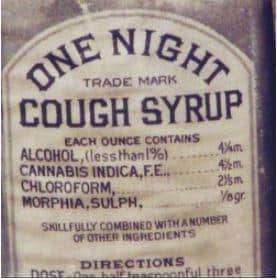
The Realities
Right off the bat, almost all the claims are not backed by any evidence. There’s a 1-2 punch from the UK and her former colonies (us, if you’re not into history). The Journal of the American Dental Association and the British Dental Journal have both published pretty thorough beat-downs of charcoal toothpaste.
It’s not a situation of the science “not catching up” to the benefits of charcoal as some claim, but the idea that there is plenty of evidence to pick from and none of it has shown to support any of the claims. There was no evidence in both literature reviews of any antimicrobial or detoxifying effect. Whitening effects were shown to be not superior to existing options.
The claims are so outrageous scientifically that Dr. Brooks, the lead researcher on the American side, called them “bold-faced hyperbole.” Guess who’s going to be on the podcast soon? Yup, the lead researcher, Dr. Brooks!
This isn’t shocking to anyone who can understand how charcoal works. That’s you now, since we talked about it in the last section.
The fact is, charcoal’s “detoxifying” effects come from its ability – when given in large doses for a period of time – to absorb potential compounds into it. Sort of like that powder the janitor used to cover vomit in elementary school. Listen – if that’s too gross, I recommend looking at the pictures above again.
The dose of charcoal in toothpaste is too low, and the time in contact with your mouth is too short, to have any impact on the overall health of your mouth.
Not to mention, your mouth doesn’t contain any “toxins” or compounds that require “detoxifying” or whatever the mommy blogger is saying.
Your mouth has food, bacteria, and saliva. Brushing with a well made toothpaste will do the same, if not more than charcoal toothpaste will, as most toothpastes contain fluoride – an important ingredient to prevent tooth decay – without risks.
Charcoal toothpaste doesn’t have the physical ability to detoxify or kill microbes when used in a toothpaste and is not superior to any regular toothpaste for cleaning your mouth.
Charcoal May Be Natural, But Is Your Toothpaste?
The big push is for a natural alternative to the “harsh” chemicals fed to you by “Big Dental.”
I carry 4 brands of “natural” toothpastes. All of them have the same ingredients making up the paste as the big guys, except they may use less fluoride at times or no SLS. The inactive ingredient profiles are almost always identical.
You’re not eating the paste, so the fear of “toxicity” from those ingredients should be a moot point.
Charcoal – Whitens Teeth By Making Them Black?
If a brand or charlatan concedes defeat on the detoxifying effects, they’ll still tout charcoal toothpaste’s ability to whiten teeth. In reality, charcoal may actually make your teeth more yellow. Let me explain…
There are two types of tooth stains – above enamel and below enamel. Charcoal, due to the fact that it is a rock, it can be quite abrasive, even if it is processed to make the smooth charcoal powder. Compared to a straight paste, many charcoals have high abrasiveness.
This abrasiveness helps strip down surface level stains, making your staining from typical lifestyle choices go away reasonably fast. No more coffee or acidic food staining! But, charcoal can also cause the enamel to be worn down.
Over time, the high abrasiveness of charcoal compared to regular toothpaste will lead to tooth decay via stripping of the enamel.
When your enamel wears down, your teeth will become yellow or dull, as yellow/brown pigments can attach to your teeth easier.
The ADA will certify toothpastes to ensure strict standards are met. One of those criteria is abrasiveness — Relative Dentin Abrasivity (RDA) must be within acceptable limits.
Many people CLAIM their charcoal is low relative abrasiveness, but because their toothpastes are not ADA certified, there is no guarantee or third party check to ensure this is true.
Besides this, unless you’re REAL thorough about rinsing your mouth after using charcoal toothpaste, you may have little black specks everywhere in your teeth and gums. Great – now when you smile there are carrots, chicken, AND black charcoal specks!
That’s a bit of a reach as it goes for compiling my “cons”, but what if you have fake teeth/veneers/etc? Those could stain easily by regular use of activated charcoal.
Speaking of stains… what about your furniture? Regular use of charcoal toothpaste WILL stain your bathroom counters and sink. Let that, uh, sink in.
Charcoal Can KILL You!
Sorta, maybe, charcoal can kill you.
The trend of charcoal doesn’t stop at toothpaste. There has been charcoal powder marketed to those who want to brush their teeth like they did in the 50s with baking powder. Or is it baking soda? Be careful which of the two you choose, you don’t want muffins growing in your gums.
If that weren’t enough, charcoal TOOTHBRUSHES exist. I know, right? The bristles are coated with charcoal powder.
The reason I bring this up is that you should know that aspiration of charcoal can be lethal. So, do like Bill Clinton and don’t inhale. If you do, get help fast. Or, don’t use the stuff.
The Other Risks Of Charcoal
Besides not being able to meet claims, stripping down your enamel, turning everything you care about to a morose black, and potentially causing a lethal aspiration if inhaled, there are other risks we need to worry about.
Drug Interactions? From Toothpaste?
Charcoal can absorb stuff. That’s why it’s used if someone ingests something harmful, right?
If you’re spitting your toothpaste, then no worries, but theoretically your charcoal toothpaste could absorb your medications or supplements if taken closely together. Just a word of caution.
Worsening Tooth Decay Because of Activated Charcoal
Most charcoal toothpastes will also be fluoride-free. If you read the blogs, marketing materials, or blogs, they’re making those disproven claims of “strengthening teeth.”
Charcoal will NOT strengthen teeth, and as we’ve shown could weaken the enamel leading to decay. Don’t get a false sense of security, especially because most of these products won’t carry fluoride.
You should use fluoride, and I detail why here.
Dirty Charcoal
I’ll say it again: charcoal absorbs stuff. It’s used in filters to remove horrible compounds and chemicals found in many processes.
If the raw material supplier isn’t careful, some of those compounds could end up in your charcoal that you’re rubbing against your jibs every night.
Neal’s Take On Charcoal Toothpaste
Here’s a summary of how I feel about the trendy charcoal toothpaste:
- As an ingredient, charcoal toothpaste can’t and doesn’t meet claims of antimicrobial activity based on best available research
- As a product, we can’t ensure we’re getting a low abrasive charcoal, and we could damage our enamel. If our product also has no fluoride, I believe using charcoal toothpaste can lead to tooth decay.
- You may have some slight color removal initially, but this is no different than other, safer whitening methods. You’ll have short term gain with long term risks.
Sit this trend out. The only benefit is the sleek black packaging. I’m a sucker for marketing.
Attack Of The Trendy Toothpaste!
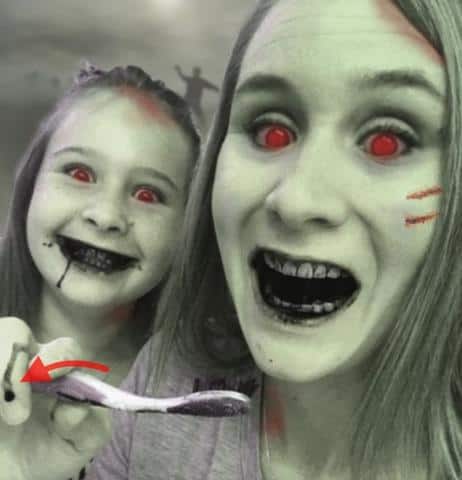
They’re coming for you! To whiten your teeth! And detoxify your soul!
(The best part of that picture is the charcoal dribbling down her hand…)
Trendy supplements should wear hats that say MAGAA: Make Ancient Gimmicks Available Again. I’m not a fan of any gimmick.
As charcoal toothpaste products practically didn’t exist before 2017, once could say this is a gimmick with an appeal to tradition.
One of the justifications for charcoal toothpaste I saw someone use was about consciousness; he believes that people now would rather use simple, natural ingredients when they can.
I agree. This could be a large reason the pendulum is swinging towards “natural.” We’re becoming aware.
Let’s not forget that arsenic and formaldehyde are natural. When formaldehyde is in your flu shot people get all in a tizzy. So there has to be something more to this mentality.
Becoming more conscious of the chemical soup we live in and making alternative choices needs more depth than “it’s natural, so it’s better.”
Everything will carry some degree of risk. It seems like something like charcoal toothpaste would be benign at worse, but that’s because we’re not looking extensively. Natural products, especially trends, get a “pass” from most of us.
Then, as the trend grows, more people participate. Since we don’t hear of anything bad, we assume the product is safe. If it wasn’t, someone would step in, right?
Listen to our podcast with essential oil guru Sylla Sheppard-Hanger for the realities of that assumption. Spoiler: harm. Frequent harm.
If we opt in to a trend, we have to remember that it’s not as simple as just grabbing any product. With these poorly regulated natural products, YOU have to take ownership of quality assurance. Am I getting the right form or dose of the ingredient?
Am I sure I understand all the risks – of both the ingredients and the risk of getting a bad product?
So please… For me. For your dentist. For your sink. Don’t use charcoal toothpaste.
Just trying to keep it real…

Neal Smoller, PharmD
Owner, Pharmacist, Big Mouth



